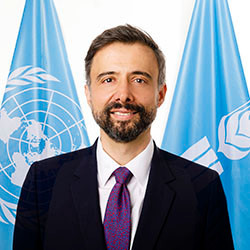International Rural Women’s Day
IFAD Asset Request Portlet
ناشر الأصول
International Rural Women’s Day
من Alvaro Lario
The year 2022 has been marked by interlinked challenges affecting the whole world. Protracted conflicts, compounded by increased climate variability, are fuelling a worldwide food crisis, which disproportionately affects women and girls.
International Rural Women’s Day is an opportunity to recognize that rural women and girls are not only victims of shocks and crises. We must also recognize that they can -- and must be -- part of the solution to the challenges we are facing. They have the capacity, the knowledge and the energy to become agents of positive change.
Biased social norms, structures and policies perpetuate gender inequality, and put rural women and girls at higher risk. Rural women and girls have limited access to and control over resources. This reduces their capacity to make autonomous decisions about matters affecting their lives, whether it’s about money, the choice of seeds or the use technology. As a result, rural women’s agricultural productivity is often lower than that of men. Today, 150 million more women than men are facing food insecurity.
IFAD is the only specialized agency of the United Nations and international financial institution with a specific mandate to reduce poverty and food insecurity in rural areas through investments in agriculture, food systems and rural development. We are uniquely placed to empower rural women and girls to transform their lives and their communities.
Empowering rural women and girls is about identifying and understanding the social norms, policies and legal constraints that perpetuate gender inequality. It is about addressing the root causes of inequality and changing mindsets. It’s about finding new and better ways for women, girls, men and boys to live, collaborate, and work together to reach their full potential.
With our partners, we have pioneered innovative participatory approaches, called “Household Methodologies”. These Methodologies encourage women and men to work together to improve relations, adopt shared decision-making, and to make workloads fairer. This strengthens the overall well-being of the household, reshapes cultural norms that hold women back, and empowers all household members to realize their potential.
The results have been transformational. Improving the status of women has led to greater agricultural productivity, improved household nutrition and increased resilience. It has also enabled women to fully participate in their communities, including by influencing local policies that affect their lives.
These results carry a crucial lesson: change is possible. But only if we eliminate the barriers that are holding back rural women and girls today. A future where women and girls everywhere prosper and are resilient is a future without hunger. And it’s a better future for everyone.
Thank you.
